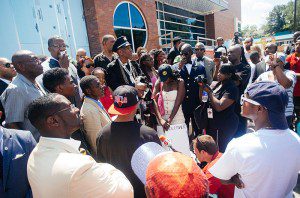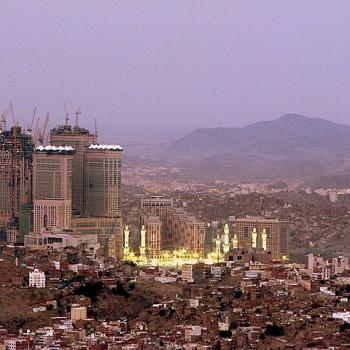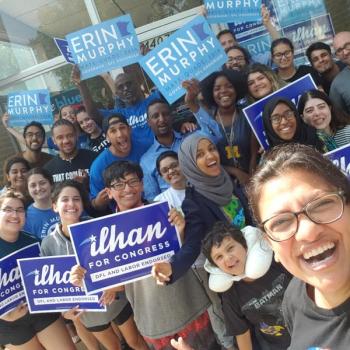
By Junaid Afeef
Not all accusations of police abuse may be legitimate, but for all but the most spurious allegations, the truth can only be uncovered after an impartial and transparent review. This is why independent investigations, at home and abroad, are indispensable for maintaining trust between the public and those charged with securing the public’s safety. Whether it is a municipal police department in Ferguson, MO, the Federal Bureau of Investigations’ pursuit of violent extremists within the American Muslim community, or Britain’s MI5 seeking to interdict the next Jihadi John, these law enforcement organizations need better oversight mechanisms to hold themselves accountable to the public.
In America, we see what happens in communities where citizens distrust law enforcement: The criminals benefit, the community suffers and the innocent may be targeted. Victims and witnesses are reluctant to cooperate with law enforcement, and as consequence, the criminals go unpunished (and free to prey on the community even more). A report released last week by the U.S. Justice Department on its investigation into the Ferguson Police Department (in Ferguson, MO) revealed widespread racism in that police force. It is this racism that sows the seeds of distrust of law enforcement among African Americans in Ferguson.
Independent Investigations in Ferguson, MO
The Justice Department investigation of the Ferguson Police Department found African Americans disproportionately stopped by the police, and it also concluded that the police regularly used excessive force against African Americans. Additionally, the investigation found evidence that the police targeted African Americans for petty violations as a means of generating revenues from fines.
The community knew this was happening, but their complaints fell on deaf ears. Only now, with an independent investigation concluded, can there be some measure of accountability enforced upon the Ferguson Police Department. Without the investigation the problems between law enforcement and Ferguson’s African American community would have faded from the public’s eye a while ago, and with that, so too would any hope of fixing the problems.
The African American community is not alone when it comes to having a strained relationship with law enforcement. The American Muslim community is also very distrustful of law enforcement as a result of the increased scrutiny placed on it in the past 14 years through the global war on terror. American Muslims have legitimate reasons to be wary of law enforcement too. (The problem pales in comparison to what the African American community has endured, but it merits fixing nonetheless)
Why Some American Muslims Mistrust Law Enforcement
The FBI uses confidential informants (the community calls them agents provocateur), and some of the indictments that stem from these operations look like entrapment. Some of the prosecutions of American Muslims on terrorism-related charges have been specious. The New York City Police Department instituted a massive and unconstitutional surveillance program targeting their Muslim residents. In July 2014 Human Rights Watch released a scathing reported titled “Illusions of Justice” which detailed many of these abuses, which raised fear and suspicion of law enforcement among American Muslim communities. To date there have not been investigations similar to the one in Ferguson into perceived abuses by the FBI.
While the use of confidential informants is an established law enforcement tactic that is used in many other criminal investigations, whom to use as a confidential informant, when to use a confidential informant and how a confidential informant is to be used are judgment calls made by law enforcement. When it appears that bad judgment has been exercised, or that policies have been violated, then the law enforcement officers involved should be held accountable.
The use of deadly force is necessary from time to time in criminal investigations. However, whenever there is an instance of deadly force used by law enforcement, there needs to be an independent mechanism to determine if it was a justifiable use of force. To hold law enforcement accountable does not require that an officer be found guilty of any wrongdoing unless the facts support such a conclusion. It requires only that fair and impartial investigations be conducted.
Jihadi John and the MI5 Connection
There appear to be a similar trust issue between the British Muslim community and MI5 (Britain’s internal investigative services). Some in Britain who knew Jihadi John (the masked ISIS killer shown decapitating innocent victims in ISIS videos) when he was just Mohammed Emwazi, blame MI5 for causing him to become a violent extremist. Asim Qureshi, the research director of a Muslim rights group in Britain called CAGE, is one very vocal proponent of this point of view. Qureshi argues that the incessant harassment by MI5 pushed Emwazi over the edge.
In response to this criticism, British Prime Minister David Cameron called the accusation “reprehensible.” Qureshi’s accusation may turn out to be reprehensible, but an investigation is warranted nonetheless.
Conducting an investigation of MI5 tactics does not absolve Emwazi of his crimes. Emwazi is solely responsible for the murders he committed. Nothing the British security services could have done to Emwazi justifies what he did to his victims. However, the investigation will serve to make MI5 more effective in its mission to keep the British public safe by eliminating tactics that are counter-productive to interdicting violent extremists (if that is what the evidence shows), and also by demonstrating that MI5 is committed to treating the British Muslim community with the same respect afforded all other British citizens.
Fair and impartial investigations into tactics and incidents perceived as excessive, abusive or illegal will help build trust between law enforcement and the communities they are charged with protecting. The Justice Department investigation of the Ferguson Police Department revealed how bad things are just below the surface in that community. It took an outside investigation to uncover evidence to support allegations made by the local African American community for quite some time.
That sort of independent investigation is the type of strong oversight that leads to real accountability. We see that happening now in Ferguson as entrenched public officials are now being separated from service (either voluntarily or through firings).
Many Cases, Too Few Real Investigations
There is still a lot of work to be done. For example, the deaths of Eric Garner (New York City) and Tamir Rice (Cleveland) at the hands of law enforcement still need to be investigated by independent authorities.
The national “Countering Violent Extremism” program is predicated on a collaboration between law enforcement and the community. Until those cases of questionable conduct by the FBI with regard to its use of confidential informants and unlawful surveillance are properly addressed, the community will remain hesitant, and the CVE effort will falter. And as mentioned above, the British government needs to conduct an independent investigation into MI5’s conduct with the British Muslim community.
Accountability, Trust, Public Safety
The misconduct and the bad judgment of a few officers can taint the entire relationship between law enforcement agencies and the communities they serve. Police officers, FBI agents and MI5 officers have difficult and dangerous jobs, but their work can be made easier and safer when they have the cooperation of the communities in which they work.
From getting drugs and illegal guns off the streets to countering violent extremism, community members can make a significant contribution towards public safety. In order to achieve real collaboration in investigating crimes and in stopping young people from getting into trouble in the first place, the community must trust the men and women charged with protecting them. This trust will come through more rigorous oversight and accountability. And that, in turn, helps keep everyone safe.
Junaid M. Afeef is an attorney specializing in criminal justice policy, a former executive director of the Council of Islamic Organizations of Greater Chicago, and a Truman National Security Project Political Partner. Views expressed are his own.











